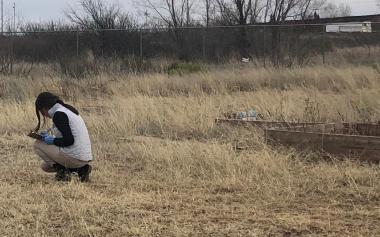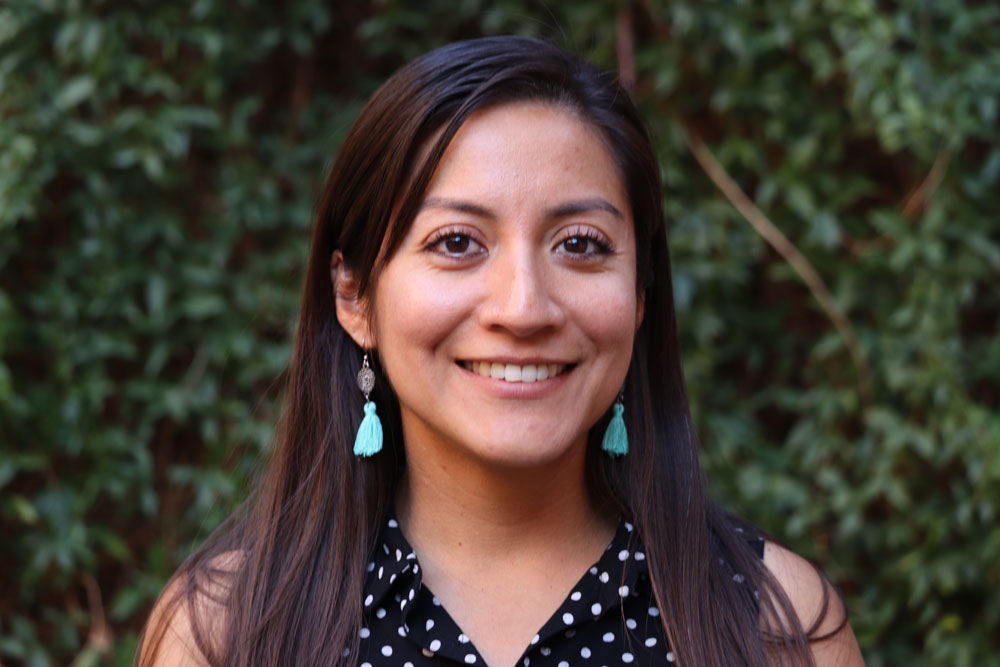Relating the magic of science to the border environment
"Alma has demonstrated her intellectual merit, passion to conduct transformative water quality research, and ability to work in intercultural teams on transdisciplinary projects."
- Dr. Mónica Ramírez-Andreotta, nominator and faculty advisor
Tell us a little about yourself.
I grew up in Guadalajara, Jalisco in Mexico. I spent all my summers with my grandparents and my cousins in Nayarit. When I was nine years old, my immediate family and I, migrated to the United States. But we maintained really strong family ties and went back to Mexico every year. Those frequent trips really maintained a strong connection and love for my culture.
I got my bachelor's degree in international relations, where I focused in the political and economic relationship between the US and Mexico. I knew I wanted to do binational work, but I wasn't sure in what. It took many years after college- volunteering, working, and going back to community college to take night classes in STEM, to conclude that environmental science stroke a good balance between being involved in what I see is the magic of scientific research, and applying that research to real time and relevant events that impact human health, quality of life, and the environment. I saw this as an area of opportunity. I could merge my newfound love of science, and my passion and interest for improving conditions at the border, into this new career.
What is your research and what are the broader impacts?
For my master's work, we worked in the community of Naco, Arizona which is a small rural town along the Arizona-Sonora border. The community of Naco was faced with a problem that is not uncommon in many border cities and towns, which is the problem of sewage overflows. These happen
Morales-Alma-Field.jpeg

whenever a large storm event occurs, or the infrastructure system is overwhelmed. Sanitary sewage overflows carry concentrated loads of pathogens and heavy metals that can have negative implications to human health, destroy property, and impact the environment. It really deters the quality of life. In the community of Naco one of the effluents was flowing near the local elementary school. The community was concerned of exposure to pathogens and potential health impacts to the children. In our research, we took topsoil and water samples, to analyze for bacteria and viruses that are commonly found in fecal contamination.
Key Takeaways
- Exposure Assessment for Incidental Soil Ingestion - In this case, we use values that were obtained through parent and teacher surveys. This considered locations of where children play or congregate before, during or after school, the type of activities the students engage in, and the frequency of hand to mouth behavior as reported by parents and teachers.
- Partnership with Local Health Department and Public School - We provided the local health department with a manual on how to take samples and all necessary collection and storage material. It was a kit that they could go into the field and take water and soil samples themselves if a sewage overflow occurred and we were not able to make it down. We also worked with Naco Elementary School’s principal and teachers to distribute the surveys. We were part of the school’s Back-to-School Night and Parent Teacher Conferences. We also participated in their 2019 summer school program where we visited a sixth-grade classroom, and we did an activity testing the water quality in their school.
We did not detect any concerning concentrations of viruses or bacteria in the soil samples. We think this may be because the soil samples were taken a few months after the last sewage overflow in the area. No sewage overflows occurred during the time that we conducted the research. So, we believe potentially viruses and bacteria died off. But I think the research at the end, presented a model or a framework that could be applied in other scenarios that could use the local self-reported values by the community, through a combination of quantitative and qualitative research.
What did you enjoy most about graduate school and your research?
What I enjoyed the most was being around other graduate students and learning about their journeys. Like why it was that they decided to go to graduate school. Some were really passionate you know about their research and their projects. Hearing their stories and how it wasn't a straight line, just like mine, gave me confidence. I felt it was okay for me to be in graduate school and be in a science program although I was a newcomer to it. Seeing them so dedicated to their research, also motivated me to make this my life for the past two years.
Another thing I really enjoyed about my research was that I came into graduate school without having a research project. But I knew what my interests were and that I wanted to work in a border community. Thus, I began got to network with other departments outside of environmental science, like the College of Public Health and other universities and professionals in the field. They helped connect me to the local health department in Naco and identify a problem that I could contribute to and was relevant.
Future plans?
I am currently finishing my first year of my Ph.D. program. I plan to get my Ph.D. in this same department, environmental science. During my master's I got a certificate in GIS, geographic information systems. I hope to apply more GIS work into future research which I have already been doing in all the projects that I’m currently working on. I hope to continue working in border communities and do research in a way that is relevant and useful to what the community thinks is important.
Words of advice?
My words of advice would be to not be afraid to reinvent yourself. We really are the authors of our own story. I never imagined myself going into science. I always really shied away from it and only discovered that I enjoyed science classes and research post undergraduate. It presented a way to create the change that I wanted to see in the issues that I thought were important. Using this newfound interest was daunting at first because I didn't feel like I belonged, or I didn't feel like I was smart enough compared to other people. But at the end of the day, we are just trying our best and working hard. Being genuine to who we are I think is the best thing that we can do for ourselves.


